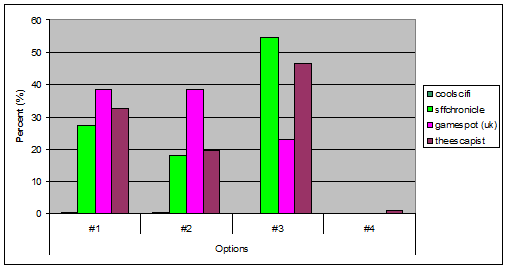James Coote
Spoon Thumb
As suggested by TheTomG in another thread, I'm doing a poll on why people play sci-fi games (or don't).
I've also put the same poll up on another sci-fi forum and two gaming forums to see how the results differ. Hopefully I can share some of the responses from each
For me, a sci-fi setting is a bonus, or often the thing that first grabs my interest in a game. I'll naturally gravitate towards screenshots of nebula-infused starfields and laserbeams streaking through the void, but more important as to whether I end up playing it is the quality of the game (the strength & execution of the storytelling and/or the game mechanics).
Not wanting to colour the debate, but I'm really keen for anyone who can expand on this point made by TheTomG, as this seems to run counter to the commonly held view amongst game developers that games are a richer medium because they can give the player the freedom to make a moral choice and live with the consequences, and even go back and make the other choice
I've also put the same poll up on another sci-fi forum and two gaming forums to see how the results differ. Hopefully I can share some of the responses from each
For me, a sci-fi setting is a bonus, or often the thing that first grabs my interest in a game. I'll naturally gravitate towards screenshots of nebula-infused starfields and laserbeams streaking through the void, but more important as to whether I end up playing it is the quality of the game (the strength & execution of the storytelling and/or the game mechanics).
I can easily see that those in love with SFF and SF novels may find games too restrictive, seeing things brought to life in such detail with little room for imagination, or finding a lack of emotional depth, etc.
Not wanting to colour the debate, but I'm really keen for anyone who can expand on this point made by TheTomG, as this seems to run counter to the commonly held view amongst game developers that games are a richer medium because they can give the player the freedom to make a moral choice and live with the consequences, and even go back and make the other choice


